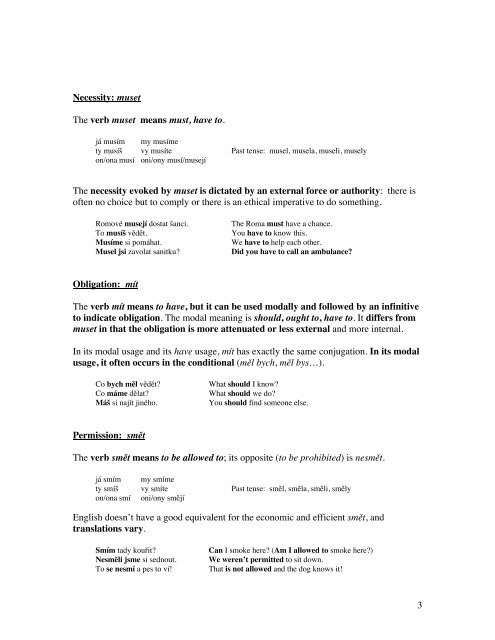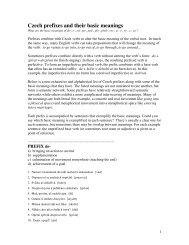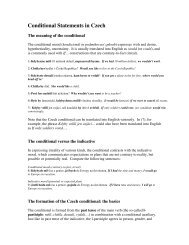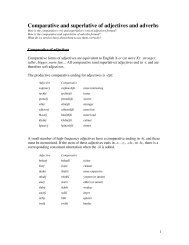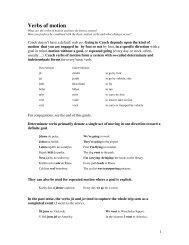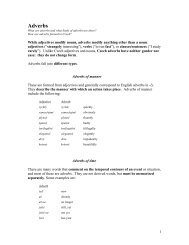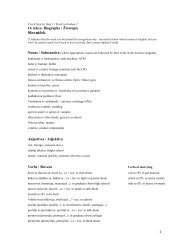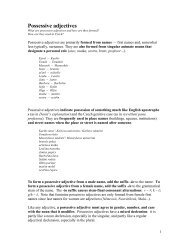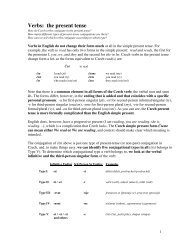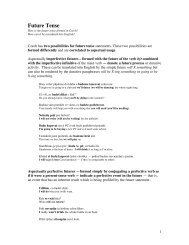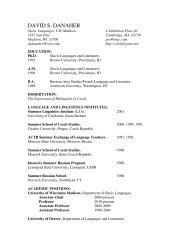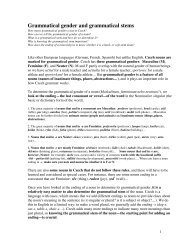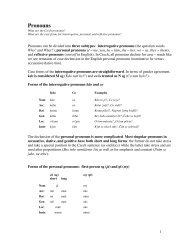Modal verbs: want, must, should, have to, can - Cokdybysme.net
Modal verbs: want, must, should, have to, can - Cokdybysme.net
Modal verbs: want, must, should, have to, can - Cokdybysme.net
- No tags were found...
Create successful ePaper yourself
Turn your PDF publications into a flip-book with our unique Google optimized e-Paper software.
Necessity: musetThe verb muset means <strong>must</strong>, <strong>have</strong> <strong>to</strong>.já musím my musímety musíš vy musíte Past tense: musel, musela, museli, muselyon/ona musí oni/ony musí/musejíThe necessity evoked by muset is dictated by an external force or authority: there isoften no choice but <strong>to</strong> comply or there is an ethical imperative <strong>to</strong> do something.Romové musejí dostat šanci.To musíš vědět.Musíme si pomáhat.Musel jsi zavolat sanitku?The Roma <strong>must</strong> <strong>have</strong> a chance.You <strong>have</strong> <strong>to</strong> know this.We <strong>have</strong> <strong>to</strong> help each other.Did you <strong>have</strong> <strong>to</strong> call an ambulance?Obligation: mítThe verb mít means <strong>to</strong> <strong>have</strong>, but it <strong>can</strong> be used modally and followed by an infinitive<strong>to</strong> indicate obligation. The modal meaning is <strong>should</strong>, ought <strong>to</strong>, <strong>have</strong> <strong>to</strong>. It differs frommuset in that the obligation is more attenuated or less external and more internal.In its modal usage and its <strong>have</strong> usage, mít has exactly the same conjugation. In its modalusage, it often occurs in the conditional (měl bych, měl bys…).Co bych měl vědět?Co máme dělat?Máš si najít jiného.What <strong>should</strong> I know?What <strong>should</strong> we do?You <strong>should</strong> find someone else.Permission: smětThe verb smět means <strong>to</strong> be allowed <strong>to</strong>; its opposite (<strong>to</strong> be prohibited) is nesmět.já smím my smímety smíš vy smíte Past tense: směl, směla, směli, smělyon/ona smí oni/ony smějíEnglish doesn’t <strong>have</strong> a good equivalent for the economic and efficient smět, andtranslations vary.Smím tady kouřit?Nesměli jsme si sednout.To se nesmí a pes <strong>to</strong> ví!Can I smoke here? (Am I allowed <strong>to</strong> smoke here?)We weren’t permitted <strong>to</strong> sit down.That is not allowed and the dog knows it!3


